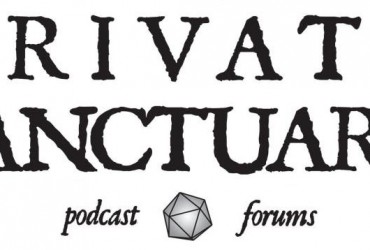Welcome to Guidance, Private Sanctuary’s source for tips and techniques for the Pathfinder Roleplaying Game, written by Everyman Gamer Alexander Augunas. Today, we’re going to be talking more about murder hobos.
Last week’s article was devoted to discussing what the “murder hobo” is and what it isn’t. This week’s article is a continuation of that one, hence the “201” in the article’s name. As previously mentioned, the problem that most GMs have with their players isn’t that they’re homeless, per say, but that they don’t have a real, emotional connection to the setting. This week we’re going to talk about strategies that help GMs make players attached to the game world.
I Don’t Want to Destroy the Earth; All My Stuff Is There!
The quickest (and easiest) way to get your players to care about a location is to give them materialistic assets there. This is the old “steal the cart” trick taken the reasonable levels.
For those of you who’ve never heard this story, Noah Antwiler (aka Spoony) gives a great example of it in this video that I recommend listening to if you’ve got about 15 minutes to burn. For those of you who don’t, the moral of the story is this; your PC’s stuff is always going to rank high on their list of concerns. Like it or not, we live in a very materialistic society and threatening the physical is going to rile up your players, especially if they’ve put a lot of time and effort into making it.
Now, how does this serve to combat the murder hobo problem? Give your PCs a base of operations to start with. It doesn’t have to be anything fancy; a run-down house will suffice. Then give your players Ultimate Campaign’s downtime rules and make building up that base an important part of your campaign. Tie EVERYTHING to that place; their reputation, their goods, their NPC supports, everything. Alternatively, you can do the same with the kingdom building rules. The point is that your PCs are going to fight to protect the stuff they’ve worked for, be it the spoils of adventuring or the marks they’ve made on the world.
Demand a Backstory and USE IT
One of the biggest mistakes that I see new GMs make is requiring a backstory from a group of PCs and never using it. If a player takes the time to hand over any amount of additional information about your character, that information is worth its weight in gold to you. Even if it is several sentences scrawled on the back of a napkin that you had to write yourself as your player spouted her character’s exposition to you at a Denny’s. Let me give you an example.
I’m certain I’ve told the story of how I got to play my kitsune cavalier, Kyr’shin, in my friend’s campaign setting. I wrote a great backstory that was designed to perfectly tie into some of my GM’s favorite parts of his campaign world. I also wrote my backstory to be especially vague, leaving plenty of potential hooks for my GM to exploit on me. My character had an adopted family with siblings and everything; I left all the windows open in this backstory. I wasn’t prepared for what he ultimately ended up doing.
Several sessions in (maybe four or five) we encountered a pirate ship that tried to rob our little dingy blind. We got into a scuffle (as PCs often do), boarded the ship, and took out the pirates. After going over the filthy ship, we discovered something that my PC didn’t think even existed: another kitsune character. Not only was my character shocked, but I was pretty shocked too. My GM had specifically said that “animal races like the kitsune” didn’t exist in his world, but here he was pulling the rug out from under my feet. Eventually we learned that an entire island of kitsune that needed help was out there and my character would have to ultimately become something of a messiah to them. (Long story short, kitsune saved!)
In its own way, this is very much like materialistic strategy. Giving players story reasons to become invested in a place is just as important as materialistic things. After saving the local kitsune population, I was basically hooked. Not only did I have a village, an army, and buildings to look after, but I also had two groups of people whom I had basically saved from certain doom looking to my character for guidance. That is a VERY powerful feeling, and it sort of goes with this next thought.
Actions Have Consequences
We use the word “consequence” negatively most of the time, but as a teacher I’m trained to think about “consequences” a little bit differently. In education, consequences are both positive and negative. If you study for a test, the consequence is that you get a good grade and your overall score in the class goes up. If you choose to throw a hissy fit, the consequence is that you are removed from the classroom and you will be required to eat lunch in silence with the teacher. Whether we like the consequences we receive, consequences firmly ground our actions in the real world and make us think about whether or not what we do is a good idea.
The same holds true for roleplaying games. Consequences need to be rewarded appropriately in order for PCs to become invested in a place. For example, if my PCs are terrifying a group of villagers, the consequence might be that they are asked to leave town, politely at first, but soon with force. If the PCs agree, maybe they will be able to save face later, or maybe they will have a bounty placed on their heads if they struggle. The point of the matter is that just as material things and history ground a character in the game world, consequences ground them to the game world as well. It makes players think about what they’d have their character do. If running around like a murder hobo has negative consequences that impact the player, you can bet that it will stop quickly.
Moral of the Story
In just about every facet of the game that we’ve talked about, the most important strategy for any GM to use to battle murder hobos is to make sure that the PCs are materialistically, emotionally, and personally grounded in your campaign setting. This is difficult to do and takes a lot of practice to get it right, though, so my best advice is this; adjust your game to suit your players.
Far too often I see GMs who claim that they’re telling “their” story and that the PCs are just taking part in it. I assure you, if you don’t take the time to make sure that the story also belongs to the players, you will sprout a crop of murder hobos. And while sometimes having murder hobos isn’t a bad thing (see our discussion on the murder hobo as it applies to the Hero’s Journey archetypal storyline), if you don’t want your PCs to be homeless, then make sure you give them an opportunity to build themselves a home in your world.
Alexander “Alex” Augunas has been playing roleplaying games since 2007, which isn’t nearly as long as 90% of his colleagues. Alexander is an active freelancer for the Pathfinder Roleplaying Game and is best known as the author of the Pact Magic Unbound series by Radiance House. Alex is the owner of Everyman Gaming, LLC and is often stylized as the Everyman Gamer in honor of Guidance’s original home. Alex’s favorite color is blue, his favorite Pathfinder Race/Class combination is kitsune homebody and he’s got a city of kitsune to rule!







Good article.
Thanks!